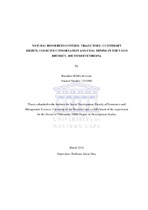| dc.description.abstract | The Yayo district in southwest Ethiopia is a biodiversity hotspot area historically
containing a rich diversity of wild coffea arabica cultivars and Afromontane forest
species of commercial and scientific value. Informed by political ecology and using
qualitative research methods, notably participant observation, personal interviews,
transect walks and analysis of secondary literature and videos, the study documents three major shifts in access, use, control and management of wild coffee and other natural resources in the Yayo district: first, village-level small-scale wild coffee cultivation and forest product harvesting; second, conservation and designation of protected forest areas and use zones, and most recently, coal mining and the future development of a fertiliser plant. The study details in depth how these three resource control regimes came to be and
especially the social impacts they entailed on local (indigenous) communities residing in four villages in the Yayo district: Achebo, Gechi, Wabo and Wutete. It concludes with a discussion on the local socio-ecological impact and challenges facing the long-term survival of the local communities and wild coffea arabica forest biodiversity in the area. Since the early 1900s, the wild coffee forests were managed and used by local, indigenous communities based on customary social institutions including Abbaa lafaa, Ciiqaashuum, Qoroo, Tullaa, Xuxxee, and Shaanee. These institutions eroded overtime as the Ethiopian state working in tandem with professional conservationists valued the wild coffee forests for their forest biodiversity and strove to control historic wild coffee use through protectionist approaches. The thesis discusses how the restriction of access
not only resulted in a range of negative social effects (such as displacement, joblessness, and landlessness) but also gave rise to occasional local conflicts and formal and informal resistance towards the conservationists and their programmes. As such, the protectionist approach did not succeed in safeguarding the wild coffees or the livelihoods of the local communities. Threats to the wild coffee forests were subsequently raised again with the rise of largescale coal mining operations in the forest. Driven by concern for economic growth, the state has shifted its attention from biodiversity preservation to supporting a coal mining operation in the area and the construction of the first-ever in country fertiliser factory in Yayo. With the advent of coal mining interests, not only have the historic customary rights and livelihoods of local communities been further weakened but also those of the
power of the conservation regime. The early construction phases of the fertiliser factory have led to involuntary displacements, unfair expropriation of villagers’ properties, forest and wild coffee clearance, emergence of new diseases such as malaria, and damage to physical infrastructure. Overall, the study shows that the progressive shifts in resource access, control and use have occurred as a result of changing ecologies, ecological knowledge and values, community dynamics, economies, and the shifting policies and strategies of the government of Ethiopia. These changes, especially the control of resources by mining proponents, suggest major challenges for the future existence of wild coffea arabica cultivars in the area and the wellbeing of local communities who had used and managed them in the past. | en_US |

